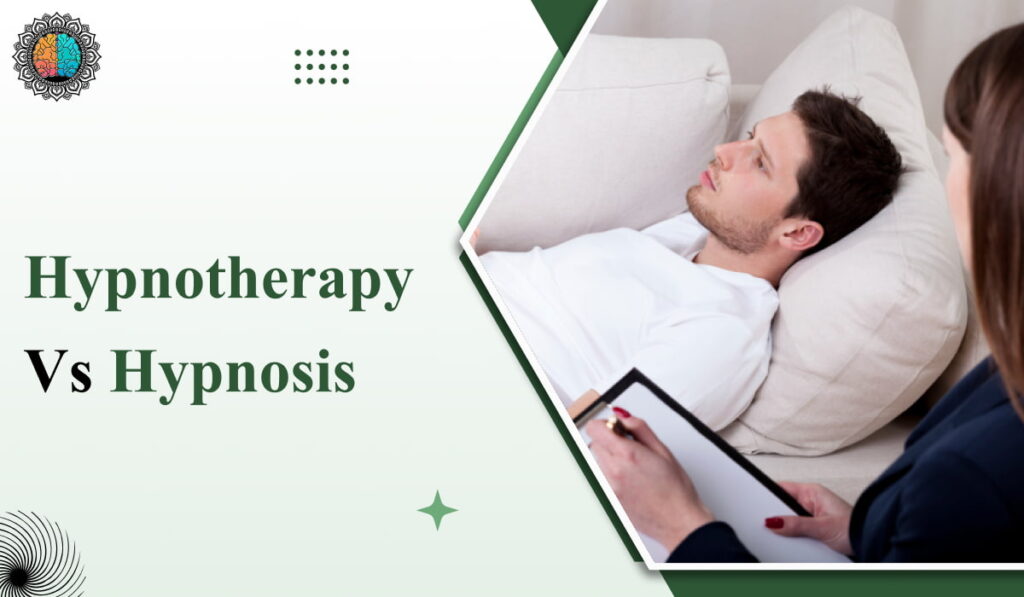
If you found your way here through a tangle of confusing and contradicting online sources, you’re not alone. Even though hypnosis and hypnotherapy have ancient roots, there is a lot of misinformation about them.
One common misperception is that hypnosis and hypnotherapy are the same. Even though they are frequently used interchangeably, they are distinct concepts.
While both terms include bringing an individual into a relaxed state of awareness, they differ in terms of the desired objectives and the level of direction provided by a qualified therapist.
As a certified hypnotherapist, I’m here to bring clarity to the subject and show you how they differ from each other.
So, let’s get started.
Hypnosis is a natural state of mind in which a person becomes very relaxed and open to suggestions. It is comparable to daydreaming or losing yourself in reading, watching movies, or listening to music. When you are in a relaxed or trance-like state of mind – your subconscious mind is more open to suggestions which makes you receptive to suggestions.
Contrary to popular belief, being in hypnosis does not involve losing control. Instead, it is a focused state of concentration where individuals remain aware and in control. Stage hypnosis, which is primarily for entertainment purposes, targets individuals who have naturally high suggestibility and are willing to participate in entertaining scenarios.
Self-hypnosis, which involves entering a self-induced trance, is a powerful tool for personal exploration and self-realization. It allows individuals to access their subconscious mind and work on personal goals or issues in a controlled and introspective manner.
Hypnotherapy is the therapeutic application of hypnosis. Hypnotherapy sessions are generally more goal-oriented and organized. During hypnotherapy, the certified hypnotherapist will help you immerse yourself in a hypnotic or relaxed state of mind. Hypnotherapy is always intended to address a specific issue or issues with strategic techniques and personalized hypnotherapy sessions.
Hypnotherapy sessions are often led by a practitioner who has received specialized training and certification in hypnotic and therapeutic techniques. During a session, the therapist will induce a hypnotic state and then employ specialized therapeutic approaches such as visualization, positive suggestions, guided imagery, inner child work, and dream therapy to address the issue at hand.
This could involve everything from stopping smoking and losing weight to addressing anxiety.
Hypnosis is similar to the deeply relaxed and focused state you might experience when you’re listening to calming music or meditating. In this state, your mind becomes more open and receptive to new ideas, making it easier to introduce positive changes. This is why hypnosis is such a powerful tool for personal transformation.
When it comes to hypnotherapy – when you are in a trance state of mind, a trained hypnotherapist uses specific, proven techniques of guided imagery, positive affirmations, or suggestions aimed at shifting your thoughts, behaviors, or feelings in a way that supports your goals.
The process is gradual, and it might take several sessions to see the changes you want. Each session builds on the previous one, reinforcing the positive suggestions. The result is a gentle yet effective way to create meaningful changes in your life, allowing you to move toward the desired outcomes.
Depending on your needs, you can either choose from hypnosis or hypnotherapy.
So, you can choose self-hypnosis if you’re looking for relaxation, stress relief, better sleep, or a way to enhance your focus and concentration. It’s a great option when you want to unwind, manage daily stress, or enhance self-awareness. It can help improve your overall sense of well-being without focusing on a specific issue.
Choose hypnotherapy when you have a specific problem or goal you want to address, such as quitting smoking, overcoming a phobia, reducing anxiety, or managing weight. Hypnotherapy is a more structured approach led by a trained therapist who guides you through targeted techniques designed to help you make lasting changes.
Here’s the wrap on everything the basics of hypnosis, hypnotherapy, hypnosis vs hypnotherapy, and everything in between.
So, whether you are looking to learn self-hypnosis techniques to calm yourself, to set yourself free from stress, anxiety, and depression, or maybe want to get higher confidence or concentration – I can help you out. I have experience working with clients with a variety of therapeutic needs and have successfully helped them in overcoming the challenges.
Also, if you would like to quit smoking, need help with weight loss, overcoming a phobia, or anything like that – then I as an experienced hypnotherapist in California would gladly assist you.
So, regardless of what you are dealing with – book a free consultation and we’ll take this further.
Jigeesha Pandya is a Certified Hypnotherapist and Reiki Practitioner. With a background in climate change research, she shifted her focus to hypnotherapy, studying at the renowned Hypnosis and Motivation Institute in Los Angeles. Jigeesha is passionate about helping individuals harness the power of the subconscious mind for healing and growth.
